As a PC and laptop refurbisher, complying to global regulations and standards isn’t just a formality – it’s a cornerstone of your business’s integrity and longevity. Despite the constant advancement of technology, the demand for refurbished computers and laptops is growing.
A recent analysis by the CMI Team forecasts the global refurbished computers and laptops market to grow at a yearly rate of 11.6%, rising from USD 4.9 billion in 2022 to USD 12.6 billion by 2032.
However, with the growing popularity of refurbished electronics, you need to understand the regulations and standards in place to ensure the safety, quality, and compliance of their products.
In this blog, we will break down the key regulations and standards that PC and laptop refurbishers should be aware of. We’ll provide you with all the information you need to confidently navigate the global market.
So, let’s take a look at the world of regulations for PC and laptop refurbishing.
What Are Global Regulations and Standards?
Global regulations and standards for PC and laptop refurbishers are essentially a set of rules and guidelines. They ensure the safe, sustainable, and ethical handling of electronic waste, as well as the quality and safety of refurbished electronics.
These regulations vary widely across the world but serve a common purpose: to minimize environmental harm, protect consumer rights, and maintain a healthy ecosystem for the refurbishing industry.
For refurbishers, following these standards not only helps in contributing to a greener planet but also builds trust with consumers looking for reliable options for their tech needs.
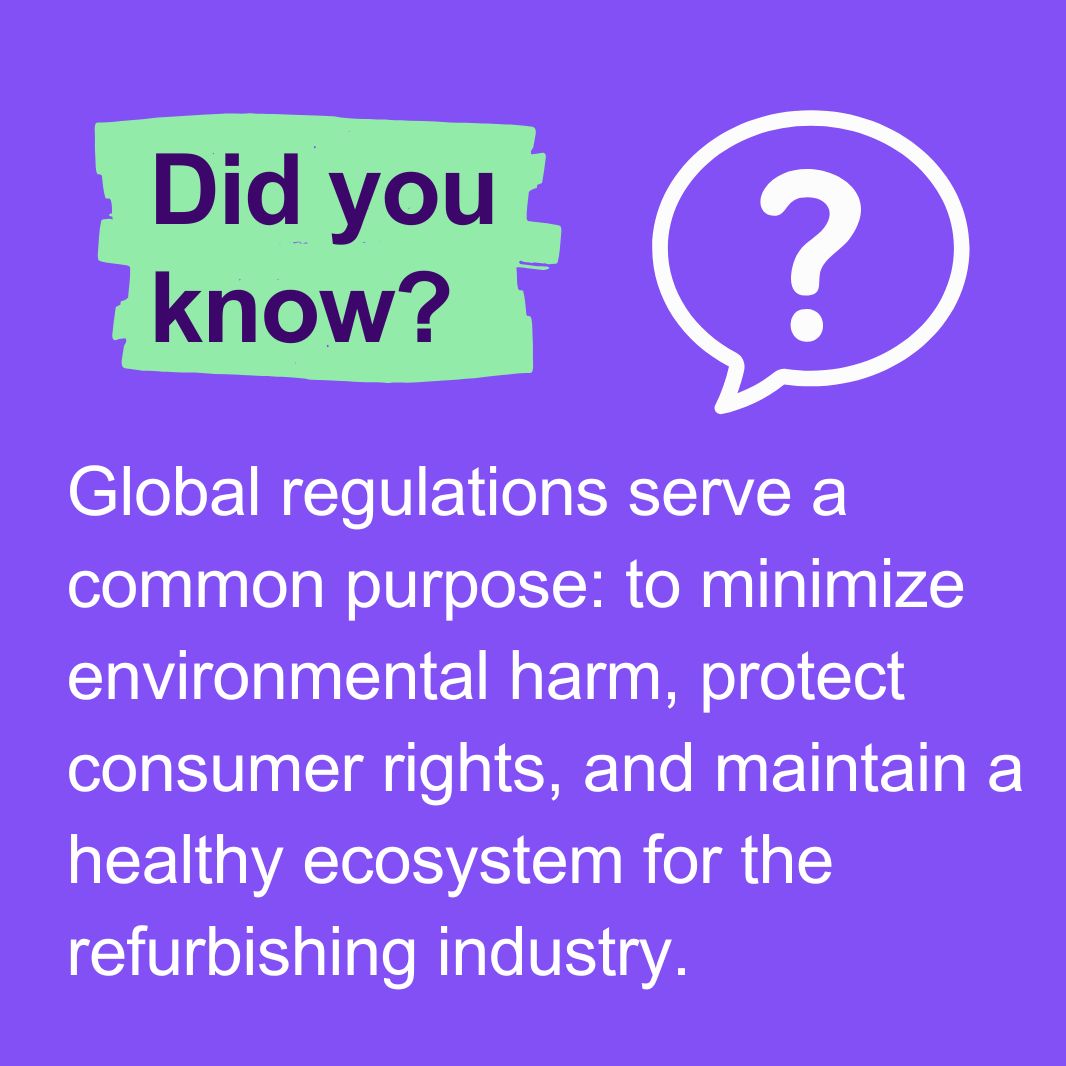
Why Refurbishers Must Pay Attention to Global Regulations and Standards?
In PC and laptop refurbishing, following global regulations and standards is crucial. It ensures safety, fairness, and environmental protection.
Let’s find out why these regulations and standards are so crucial for refurbishers.
- Keeping Customers Safe: Following the rules ensures refurbished computers and laptops are safe for use. Safety is the top priority.
- Protecting the Environment: Regulations ensure refurbishing doesn’t harm the environment. It includes proper recycling and avoiding harmful chemicals.
- Building Trust with Buyers: Customers trust refurbishers who follow the rules. It boosts their confidence in buying from them.
- Avoiding Legal Trouble: Not following the rules can lead to fines or being banned from refurbishing.
- Staying Ahead in the Market: Refurbishers who keep up with new regulations and standards can work more efficiently and effectively.
In short, refurbishing PCs and laptops is not just about fixing old computers. It’s about doing it responsibly, safely, and ethically by following the rules set by different countries around the world. By paying attention to these regulations and standards, refurbishers can make sure they are doing their best for their customers, the environment, and themselves.
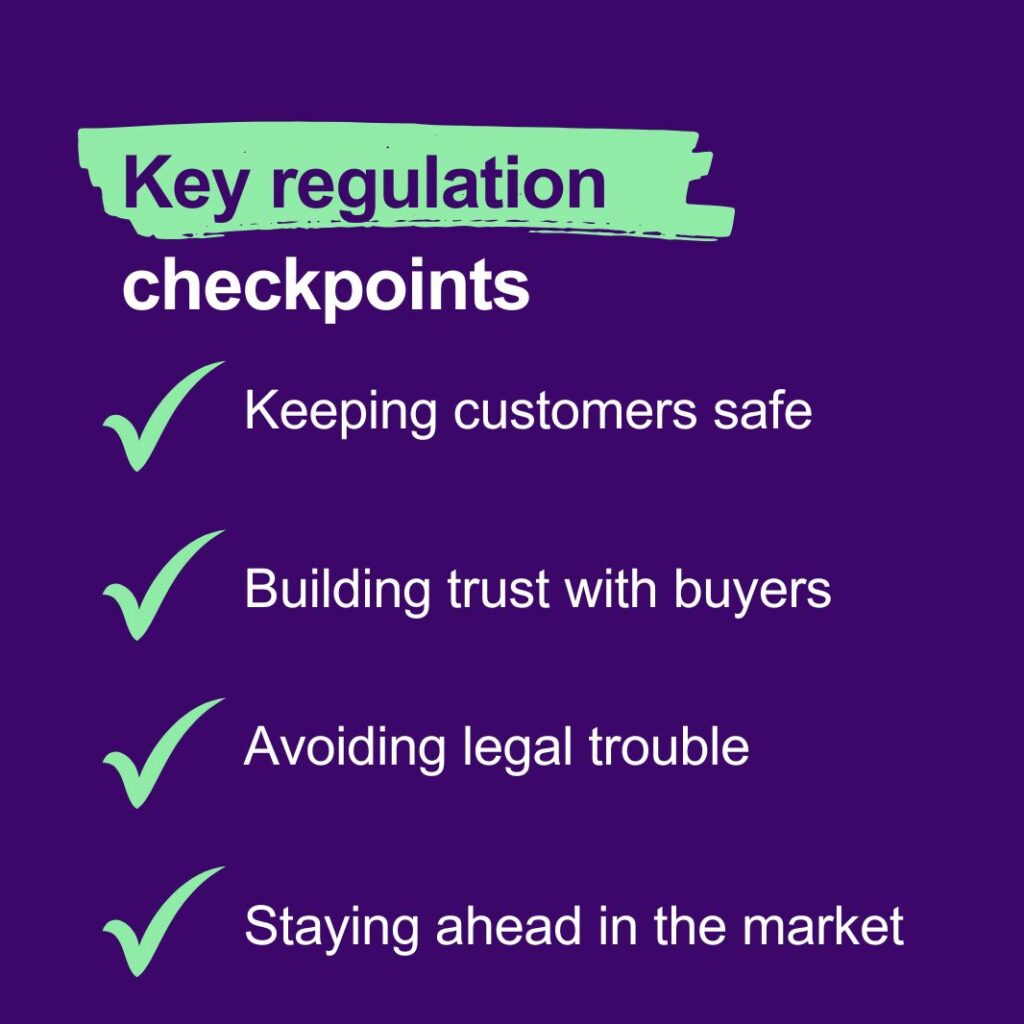
List of Global Regulations and Standards for PC and Laptop Refurbishers
In this section, we’re going to talk about the important rules and guidelines from around the world that help people who fix and sell old computers and laptops. They prioritise safety and compliance. It’s like a big list of dos and don’ts that help refurbishers do their job the right way.
Let’s take a look at what these rules are and why they’re so important!
Key Regulations in Europe: WEEE and RoHS
In Europe, when we talk about refurbishing PCs and laptops, there are some very important rules to follow. These rules help keep our planet clean and make sure that the computers are safe for everyone to use.
The two main rules are WEEE and RoHS.
Let’s take a closer look at what these mean and why they’re so important.
WEEE (Waste Electrical and Electronic Equipment)
This rule ensures safety when electronic equipment is disposed. It stops harmful stuff from hurting the environment.
- It encourages recycling and reusing old computers.
- It ensures harmful materials are disposed carefully.
RoHS (Restriction of Hazardous Substances)
This rule says that certain dangerous materials can’t be used in making electronic equipment. It keeps both the people making the electronics and the people using them safe from toxic substances.
- It lists specific bad materials like lead and mercury that can’t be used.
- It makes electronics safer and healthier for everyone.
Understanding and following these rules is very important for anyone in Europe who wants to refurbish laptops and PCs. Not only does it keep people and the planet safe, but it also makes sure that the computers can be enjoyed by their new owners without causing harm.
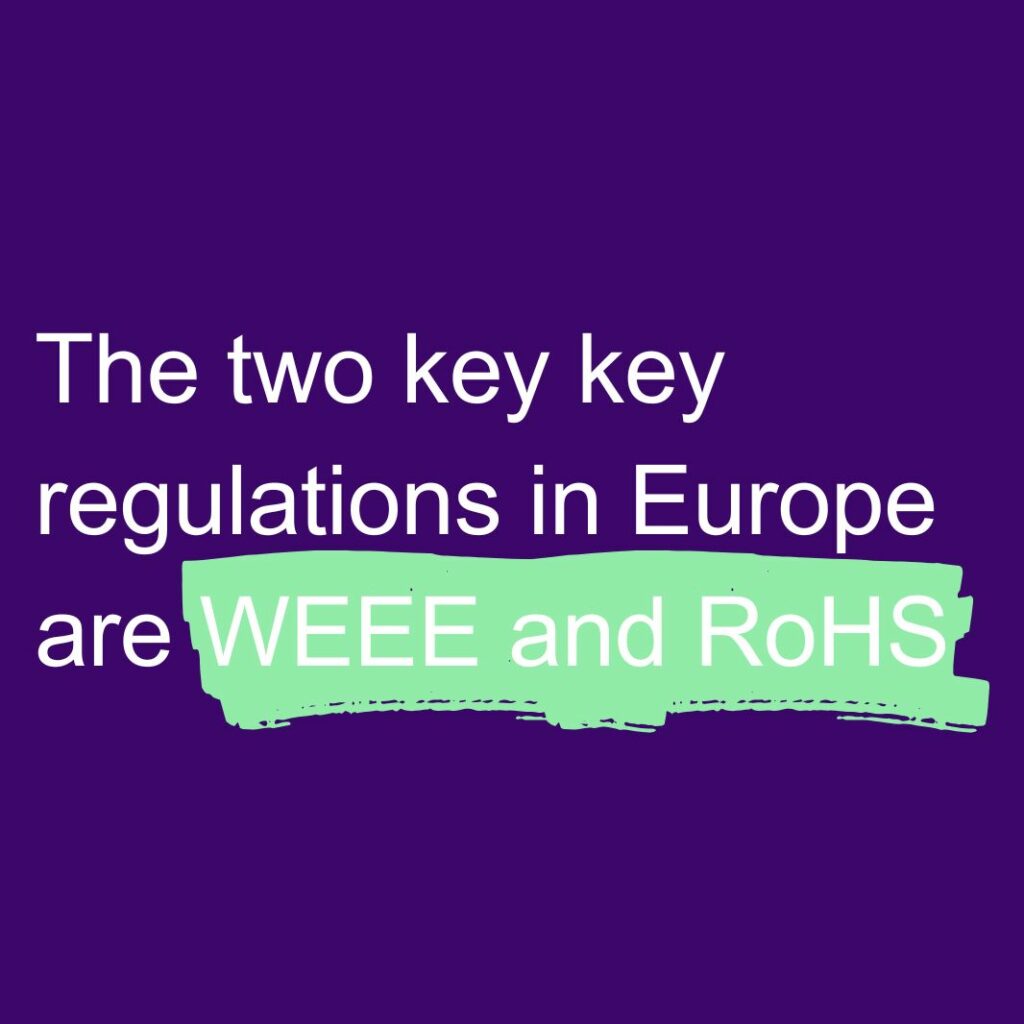
Understanding the USA’s R2 and e-Stewards Standards
When refurbishing in the USA, there are two major names we need to be aware of: R2 and e-Stewards.
Think of them as the superheroes of computer refurbishing standards, ensuring that everything is done safely and responsibly. Their primary objective is to protect the planet and ensure people’s safety while making old computers new again.
Let’s learn what makes these standards so special.
R2 (Responsible Recycling)
This standard focuses on recycling computers and other electronic gadgets in a way that is safe for the environment. It’s like ensuring that we recycle our plastic bottles and paper so that they don’t harm the Earth.
e-Stewards
This one is all about ensuring that when computers are recycled or refurbished, nothing harmful is sent to other countries. It’s like ensuring that we clean up our mess instead of leaving it for someone else to deal with.
Both standards are significant in keeping workers and the environment safe from dangerous substances found in electronics. Old data on refurbished computers is also wiped clean so that no one’s personal information gets out.
By choosing to refurbish under the R2 and e-Stewards guidelines, companies are saying “yes” to protecting the planet and ensuring safety and privacy for everyone. It’s a significant responsibility, but one that comes with great rewards, such as a healthier planet and happier customers.
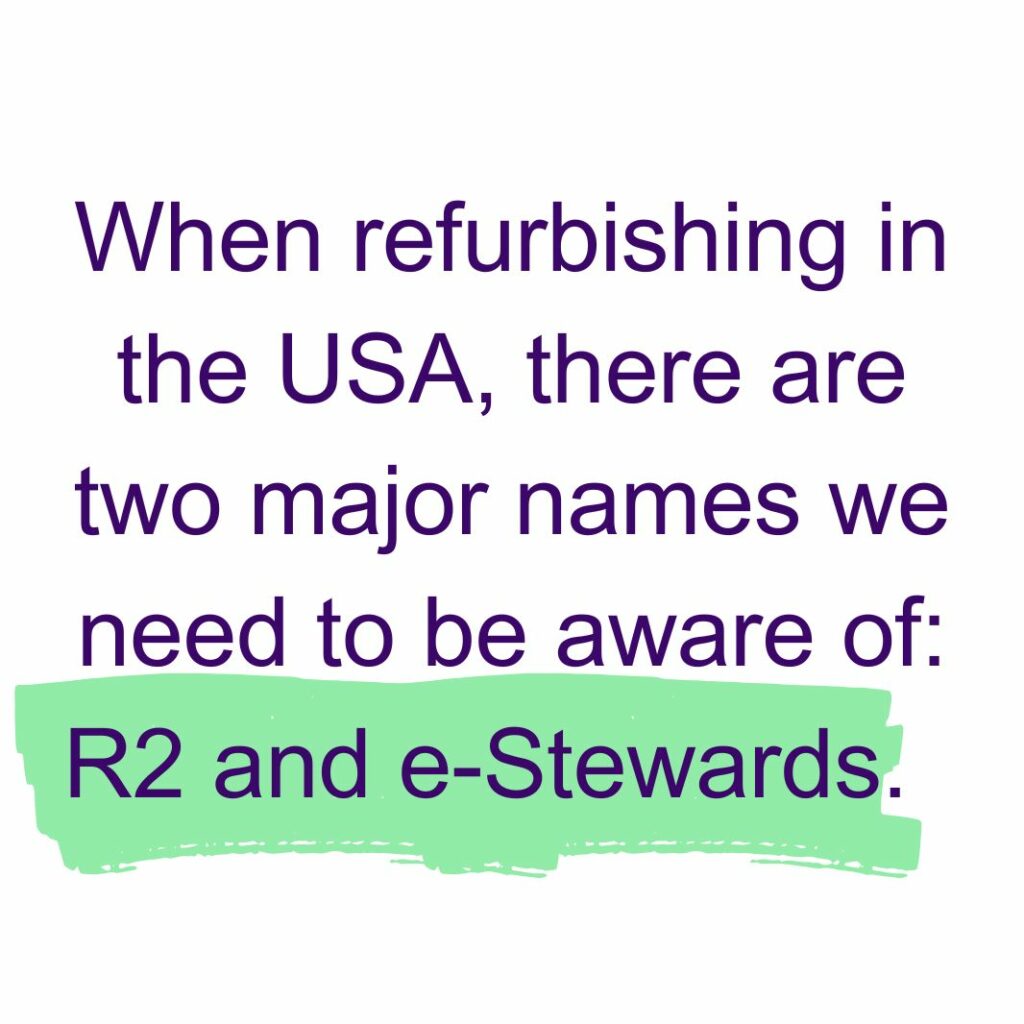
Asia’s Approach: Different Countries, Different Rules
In Asia, each country has its own rules for refurbishing PCs and laptops. Refurbishers must follow these unique regulations for each country.
Japan focuses a lot on saving energy and resources, so their rules make sure that refurbished computers use less power and are more efficient.
On the other hand, countries like China have strict rules about importing and exporting used electronics. Refurbishers have to be very careful about where they get their computers from and where they send them.
In South Korea, there’s a big emphasis on making sure electronic waste is handled properly. They have to think about what to do with the unwanted parts, ensuring they don’t harm the environment.
India, too, has been working on rules to manage electronic waste and make sure refurbished computers meet certain quality standards.
What’s interesting about Asia is how these different rules push refurbishers to be creative and think of new ways to refurbish PCs and laptops safely and responsibly.
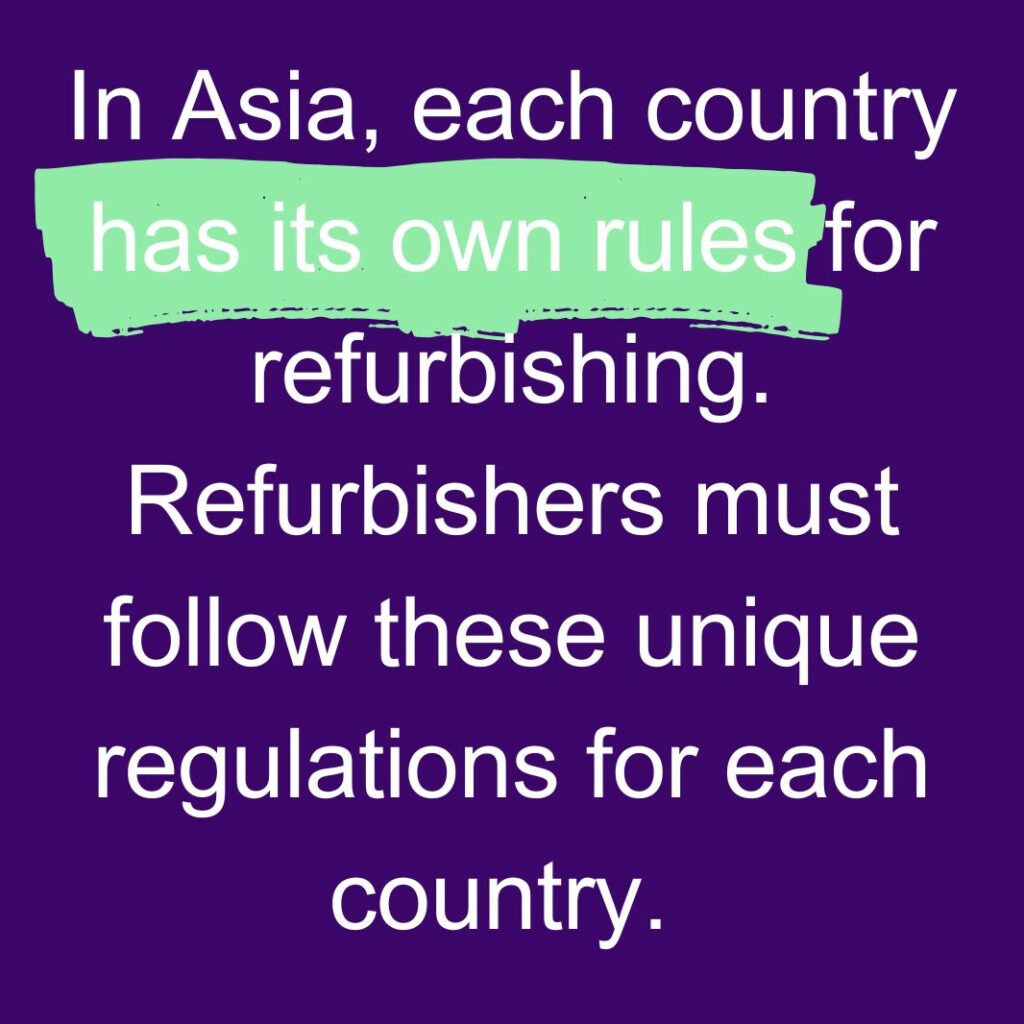
The Role of Certifications in Refurbishing
Certifications are like special badges that refurbishers earn to show they are good at what they do. They prove that a refurbisher knows how to safely fix and clean up pre-used PCs and laptops, making them as good as new without harming the planet. Certifications help customers trust that the devices they buy are safe, reliable, and kind to the Earth.
Here’s why these badges are super important:
- Shows Expertise: Earning certifications shows a refurbisher is an expert in making pre-used computers new and safe.
- Gains Trust: When refurbishers have certifications, it makes people more comfortable buying from them.
- Follows the Rules: Certifications mean that refurbishers are following all the important rules about how to handle pre-used devices without hurting the environment.
- Keeps Everyone Safe: They make sure that all the bits and bobs inside your computer are handled properly, so they don’t cause any harm to people or the planet.
- Better for the Planet: Certifications encourage refurbishers to recycle parts that can’t be used anymore, helping to cut down on waste.
Earning these special badges isn’t easy, but it’s worth it. It shows that a refurbisher is committed to doing their best, not just for their customers, but for the whole world.
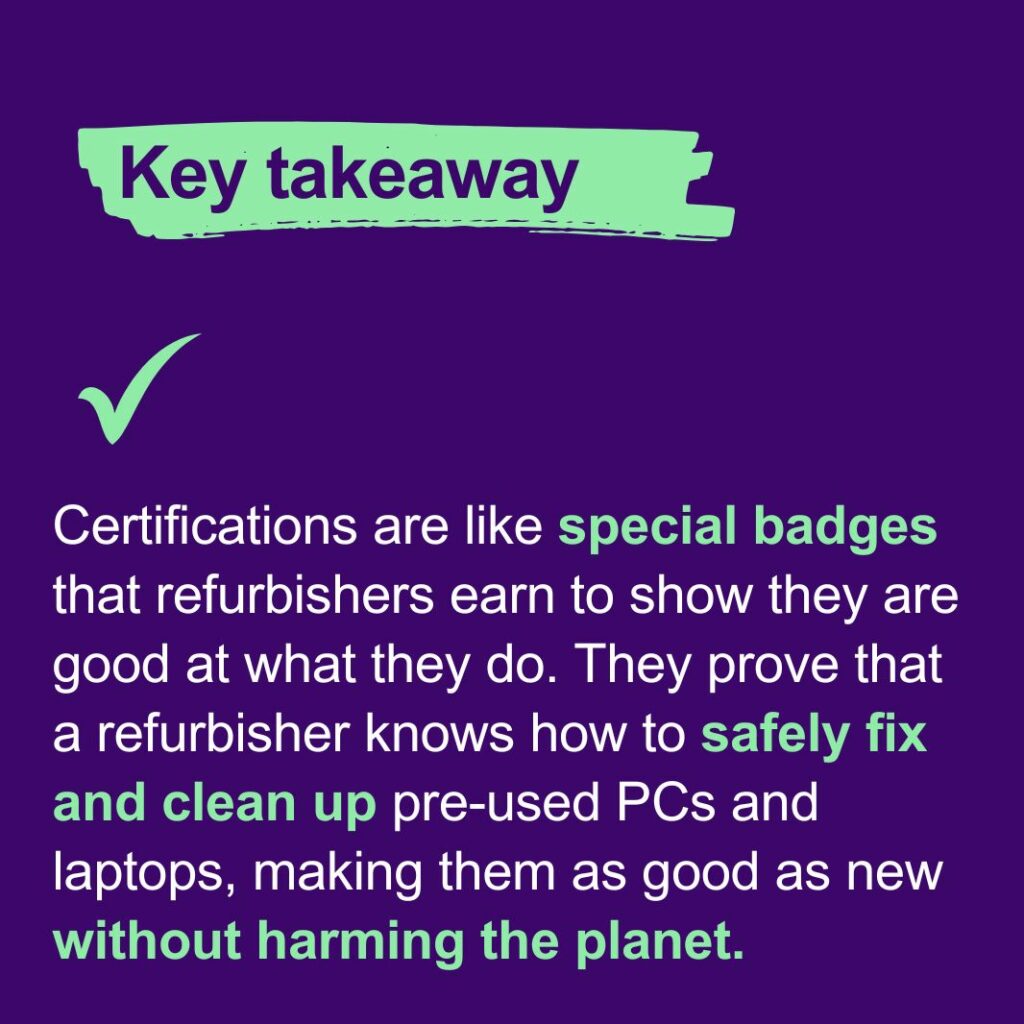
How SMART DPK Facilitates Global Compliance Standards
Overcoming the complexities of global compliance can be a challenge for any PC and laptop refurbisher. SMART DPK offers an easy solution that not only simplifies this process but also ensures that your refurbished devices meet international standards. This tool is designed to help you manage and apply legitimate Windows licenses with ease.
Key Benefits of Using SMART
- Simplified Licensing Process: SMART provides a cloud-based platform that makes it easy to manage and inject Windows licenses into refurbished PCs and laptops.
- Quick Compliance: By using it, you quickly align with Microsoft’s standards, ensuring your refurbished products are compliant with global regulations.
- No Expertise Required: You don’t need to be a tech wizard to use it. It’s designed to be user-friendly, making compliance accessible for everyone.
- Microsoft Authorization: As a Microsoft Authorized Refurbisher, using SMART allows you to place the Genuine Microsoft Refurbished Label on your products, which is recognized globally.
- Faster Market Access: As a Microsoft Authorized Refurbisher, SMART allows you to sell second-hand devices with the Genuine Microsoft Refurbished label as a Microsoft Third Party Refurbisher.
- Cost-Effective: Avoid the expense and complication of traditional licensing methods, reducing overheads and boosting your profitability.
In short, SMART is more than just a tool; it’s a pathway to ensuring that your refurbishing business meets the highest global standards easily and efficiently. By integrating it into your operations, you’re not just complying with the law – you’re also opening doors to new opportunities and building trust with your customers worldwide.
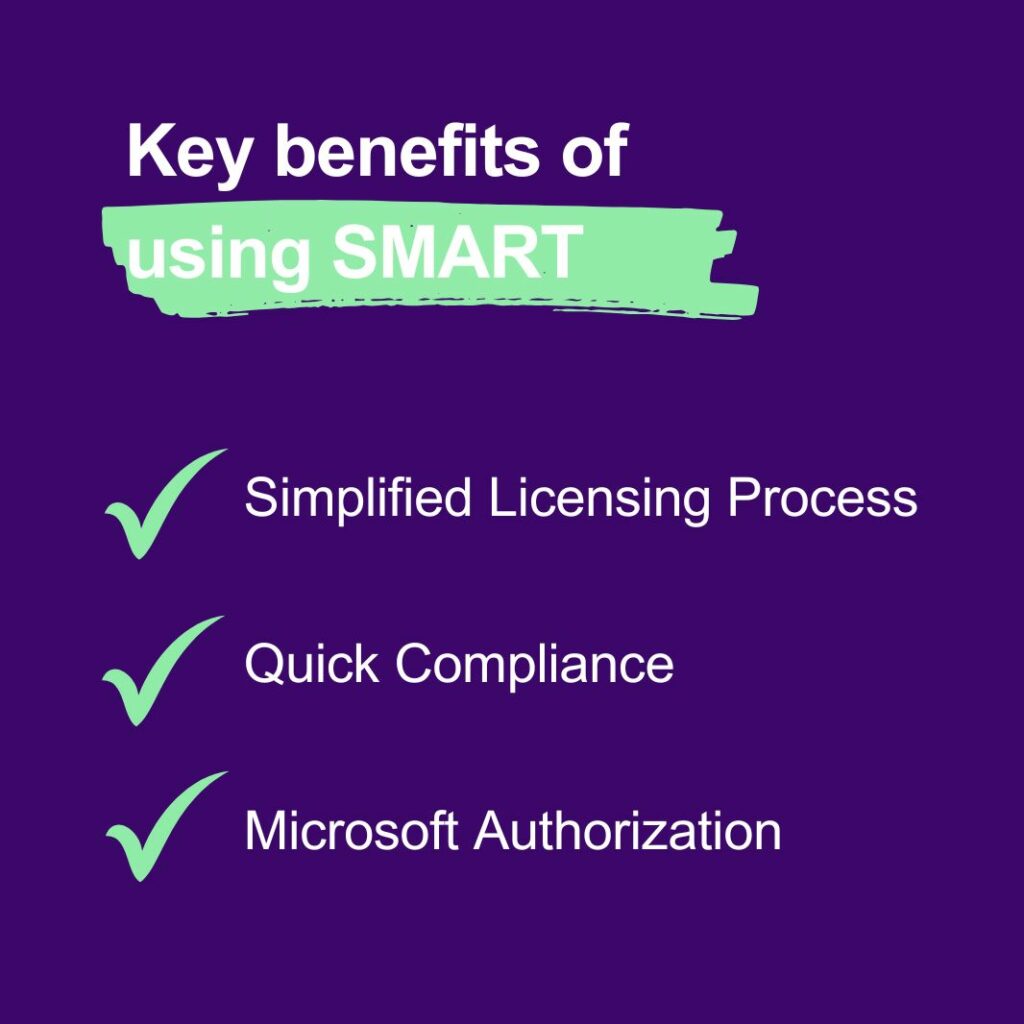
The Future of PCs & Laptops Refurbishing and Regulations
The world of PCs and laptops is always changing, and so are the rules about how we make them new again. The way we refurbish PCs and laptops is transforming. It’s all due to new ideas and ways of doing things that help our planet.
As we look ahead, there are a few things we might see in the future of PC and laptop refurbishing.
- More Recycling: We’ll find even better ways to reuse parts from old computers, making less waste.
- Safer Materials: Computers will be made with materials that are safer for everyone and the Earth.
- Stricter Rules: There could be tougher regulations to make sure all refurbished computers are as good as new ones.
- New Technologies: We might use new tools and machines that make refurbishing quicker, easier, and safer.
- Global Teamwork: Countries might work together more to make sure the rules are the same everywhere, making it easier to refurbish computers in a safe and eco-friendly way.
- Learning from Nature: We could learn from how nature handles waste and recycling, making our refurbishing processes even greener.
As we step into the future, the world of refurbishing PCs and laptops is set to become even more exciting. We’ll see new ways to bring old computers back to life, making sure they’re safe for us and kind to the planet. This journey is all about innovation and working together, making sure that refurbishing keeps up with the times. So, let’s keep our eyes open for what’s coming next, ready to embrace the changes and make the most of them for a greener, cleaner world.
Final Thoughts
Wrapping up our journey through the world of regulations and standards for PC and laptop refurbishing, it’s clear that staying informed is key. Refurbishers need to navigate through the rules to ensure they do their work correctly and safely. Keeping up-to-date with global regulations and standards isn’t just about avoiding trouble; it’s about being the best in the game.
By understanding and applying these rules, refurbishers can ensure their products are safe, environment-friendly, and trusted by customers everywhere. Whether you’re a refurbisher working hard to meet these standards, or a customer choosing your next gadget, what we’ve learnt together matters. It’s all about making choices that are good for us and our planet.
Did you find this guide helpful? We hope it sparked your interest and showed you the importance of keeping informed about global regulations and standards.

